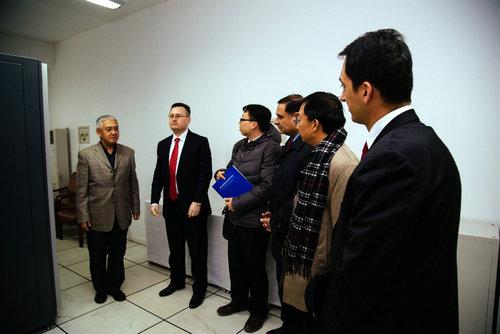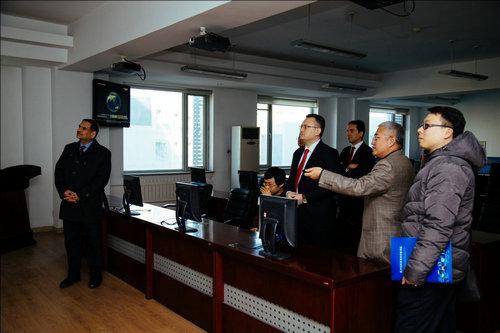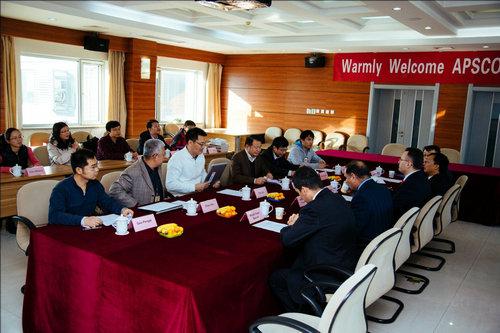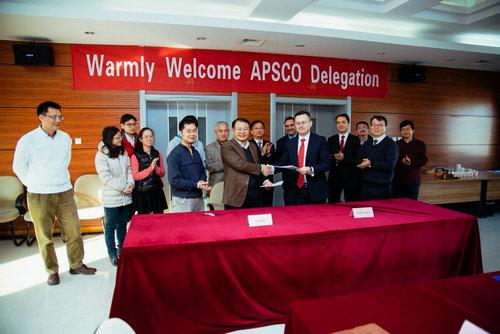On Dec. 4th 2014, the Secretary-General of Asia-Pacific Space Cooperation Organization (APSCO), Mr. Celal Unver leading a delegation visited National Astronomical Observatories, Chinese Academy of Sciences (NAOC). The entourages included Vice Secretary-General Li Xinjun, Director-General of Department of Strategic Plan and Program Management Maqbool Ahmad Chaudhry, Director-General of Department of External Relations and Legal Affairs Murat Yasar Bayrak, and project manager Teng Dapeng. Dr. Yan Jun, the Director of NAOC, led the related staffs and welcomed APSCO delegation.
The delegation first took a look at computing facility room and demonstration hall of research group of NAOC. Professor Zhao You gave a detailed introduction on current situation in this field. Director Yan Jun, Director of Engineering Project Department Bao Shudong, Director of Scientific and Research Department Pan Jun, and staffs from research group held a friendly discussion with the delegation. Mr. Celal Unver introduced APSCO. Then, Dr. Pan Jun gave a presentation on the development of NAOC and research fields. Director Yan Jun gave a short explanation about NAOC’s achievements on space debris research. After that, the two parties signed the “agreement on hosting service for accommodating data center equipment and operation center of APOSOS project”. According to the agreement, APSCO would provide all functional hardware and software used for establishing the data center and operation center of APOSOS, while NAOC would provide a facility room dedicated for accommodating the hardware equipment and assign professional staff to do the daily operation and maintenance for 10 years.
As a milestone of APOSOS project, the signing of this agreement would improve the construction and development of APOSOS to a new essential stage. As well, the friendly cooperative relationship of APSCO and NAOC was getting stronger. Both parties have realized the significance of the APOSOS Project and have the common interests to extend the above cooperation to more and deeper fields in space science and application.
Asia-Pacific Space Cooperation Organization (APSCO) is a multilateral inter-governmental organization with full international juridical personality and has been operating for six years since its Inauguration Ceremony hosted in December 2008. The main objective of APSCO is to promote the peaceful uses of outer space in Asia-Pacific Region, and to carry out the cooperation in the fields of space science, space technology and space applications among Member States and regional countries. In 2009, APSCO was granted the permanent observer status to the Committee on Peaceful Uses of Outer Space of United Nations. At present, APSCO has eight Member States and one Signatory State, namely Bangladesh, China, Iran, Mongolia, Pakistan, Peru, Thailand, Turkey and Indonesia. The Headquarters of APSCO is located in Beijing for which the building and equipment are donated by the Government of the Host Country, the People’s Republic of China. The Asia-Pacific ground-based Optical Space object Observation System (APOSOS) belongs to APSCO. It aims to develop a regional ground-based optical observation network. The network will be used to track space assets, space objects of interest in order to provide security to space assets launching and orbiting. The system will benefit from the wide geographical distribution of APSCO Member States and Participating Countries, multi-national fund support and technical cooperation. The project was initially proposed by Peru, Turkey and China during the first council meeting of Asia-Pacific Space Cooperation Organization (APSCO) in 2008. On the second council meeting of APSCO in 2009, it was decided to carry out the feasibility study of APOSOS, meanwhile China and Turkey were assigned as the leading states of the project. In 2010, NAOC was entrusted to do the feasibility study. The feasibility study report of this project was standardized in December 2010, and then, in January of 2011, the APSCO 4th Council Meeting formally approved the construction work for Phase I of this project. Professor Zhao You of NAOC leading the research group organized and implemented the whole process of the project from the initial proposal, the feasibility study to the current construction stage. With mutual support and help from NAOC and APSCO, a series of period achievements were obtained, including the training course for staffs from member states in 2011, joint observation using existing facilities in 2012, and site selection and the beginning of new telescope R&D in 2013. Currently, the new APSCO telescopes have finished development and are now waiting for delivering to the host member states for installation. As the core of observation network, the establishment of data and operation center is urgent to develop.

APSCO delegation visit the computing facility room

Professor Zhao You introduces the current situation

APSCO Secretary-General Mr. Celal Unver introduces APSCO

Agreement signing ceremony













